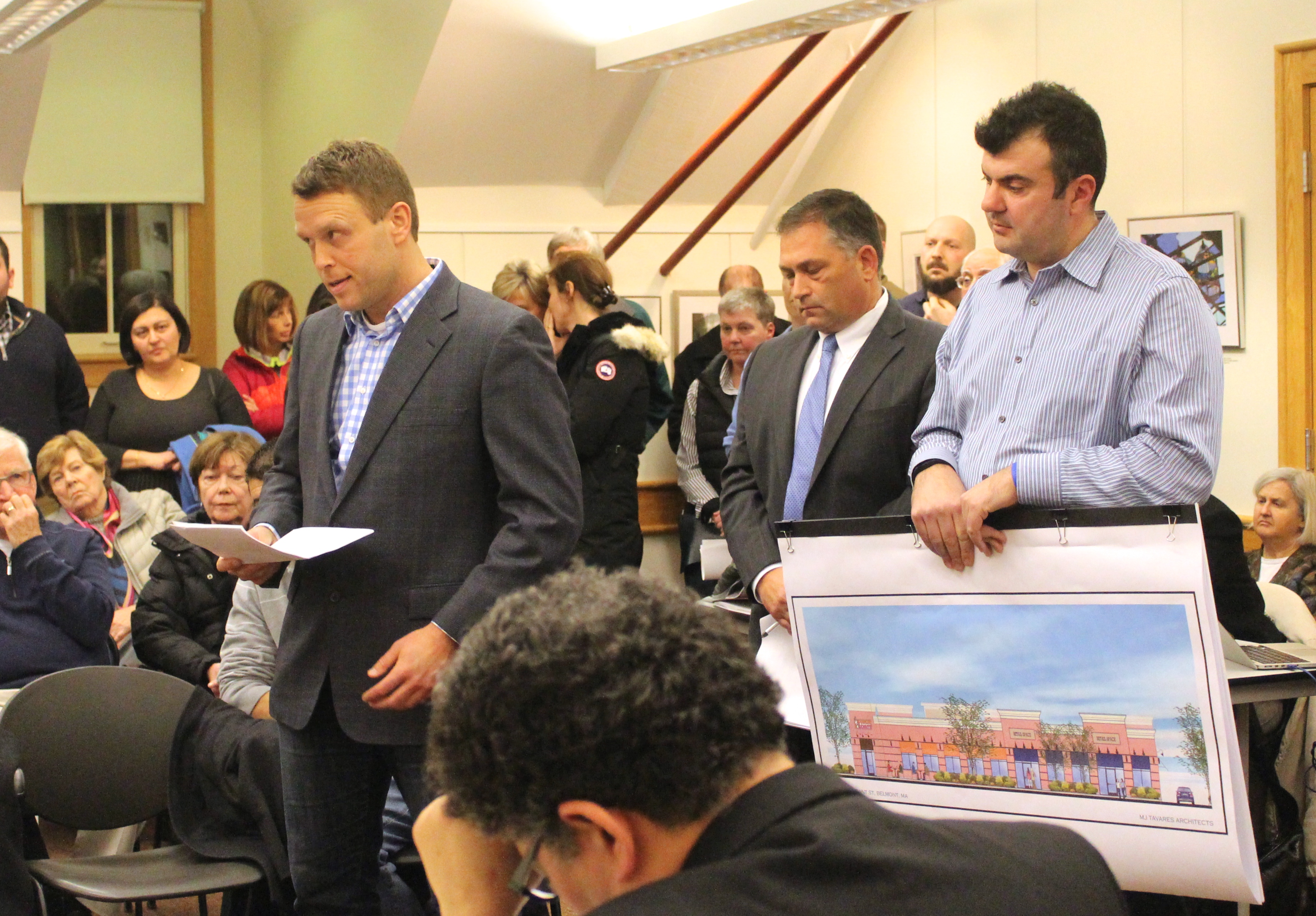Photo: Brighton Street’s Russell Mann at the ZBA meeting Jan. 11.
Belmont’s reputation as a hard nut for businesses to crack was put in the spotlight Monday night, Jan. 11, as the Zoning Board of Appeals voted down applications for permits from two entrepreneurs.
In a pair of 3-2 votes, the board denied a special permit to the owner of 20 Dunkin’ Donut franchisees from opening his first shop in Belmont due to traffic and parking concerns.
Earlier, a request by a homeowner that would allow her to rent rooms to short-term visitors through the website Airbnb was rebuffed for allegations of safety and quality of life issues, concerns that two ZBA member dismissed as “red herrings.”
After the Airbnb vote, a ZBA member who voted to issue the permit suggested the homeowner just skirt the town’s bylaw until the town creates new guidelines for this modern disruptive rental scheme.
In a packed Belmont Gallery of Arts, more than 75 residents assembled to oppose many of the applications before the board in a meeting that took four hours to place a damper on
The application that sparked the most interest came from the Leo Family which sought to build a Dunkin’ Donuts franchise in a three-store strip mall at 344 Pleasant St. The Leos – son Nicholas and father Vincent – purchased the service station/former gas station for $1 million in 2014 with the intention to run “an excellent business” like his existing stores nearby in Fresh Pond and Massachusetts Avenue, said Nicholas Leo.
Anticipating questions about traffic to and from the site, the Leo’s traffic consultant David Giangrande, president of the transportation and civil engineering/land surveying firm Design Consultants, Inc., of Somerville, conducted a trip study analysis showing that a donut shop would generate 24 percent fewer trips than a service station over an hour during the morning rush, or about 75 customers.
But those assumptions were challenged by several members pointing out much of the data was gleaned through “industry standards” for businesses of that size, which did not take into effect traffic needing to cut across the street to enter the operation.
Supporters of the Leo’s plan such as Timothy McCarthy of Simmons Avenue said the proposal would be “a great use” as he and his neighbors are “tired of the vacant and abandoned” service station.
But many at the meeting opposed what they viewed as a high volume, fast food establishment that will attract vehicular traffic to an already congested intersection.
Russell Mann, an immediate abutter on Brighton Street, worried that the increase in traffic would create bigger traffic delays as vehicles heading towards Belmont Center on Pleasant Street attempted to take a left-hand turn into the strip mall that, with 21 parking spaces, is not enough for the activity the store hopes to bring in.
“This is not a referendum on development of the property, or on the Leos … who run a good business. It’s about this special permit for use of fast food is appropriate for this location,” he said.
Others noted that several parking spaces will be occupied by monitoring equipment as the location is under a government order to remediate the soil of dangerous levels of contaminants while some pointed to early-morning deliveries and assumptions that employees would park on neighborhood streets.
In the end, ZBA Chairman Eric Smith and Tino Lichauco who were not comfortable with the assumptions made in the traffic study and possible issues with parking which Smith felt was limiting.
A dejected Leo, who stayed the four hours waiting for the decision, would not comment on whether he would appeal the vote nor would speculate on the future of the site. The location is zone “as right” for a retail operation such as a convenience store.
The outcome of Anne Levy’s request to allow her to rent a room legally for less than a week in her Taylor split-level through the rental website Airbnb.
With the Planning Board deciding to push off reviewing the town’s lodging bylaws concerning this new way of boarding visitors, it was unlikely that the ZBA members would change their vote when they denied a special permit last month for an Airbnb host. (Currently, homeowner can rent a room for more than a week “as right”; yet most Airbnb rentals are for between two-to-four days.)
As with the first Airbnb case, some neighbors worried their quiet street would soon resemble a bustling tourist-lodging location with strangers in “Uber cars” coming at all hours of the night.
While accepting member Jim Zarkadas’ no vote on the principle that the Planning Board needs to set the regulations, Lichauco and member Craig White, who along with Smith voted to approve the application, criticized the objections raised that an Airbnb rental is inherently unsafe and un-neighborly as fearmongering.
After the vote, Lichauco made the suggestion to the estimated 65 residents who rent via Airbnb: Simply make the customers sign a one-week lease and “reimburse” them for the days they don’t need the room all in the same transaction.
“If they wish to do so, it is up to them. However, I am not going to advise them to do so,” said Ara Yogurtian, assistant director of community development.








Leave a Review or Comment